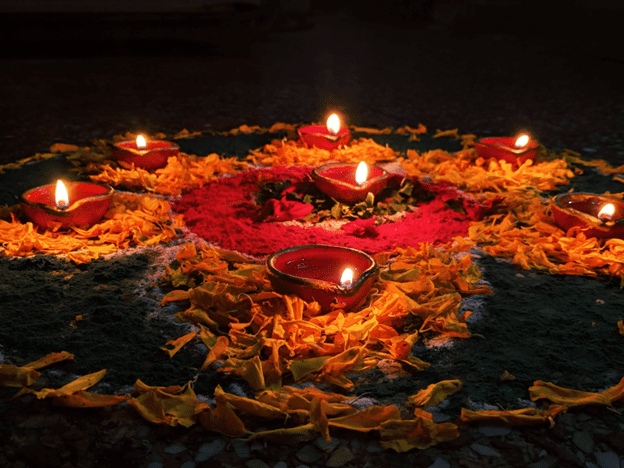Diwali | A Closer Look At The Festival of Lights
A guide to Diwali, one of the most significant Hindu festivals symbolising the victory of light over darkness.
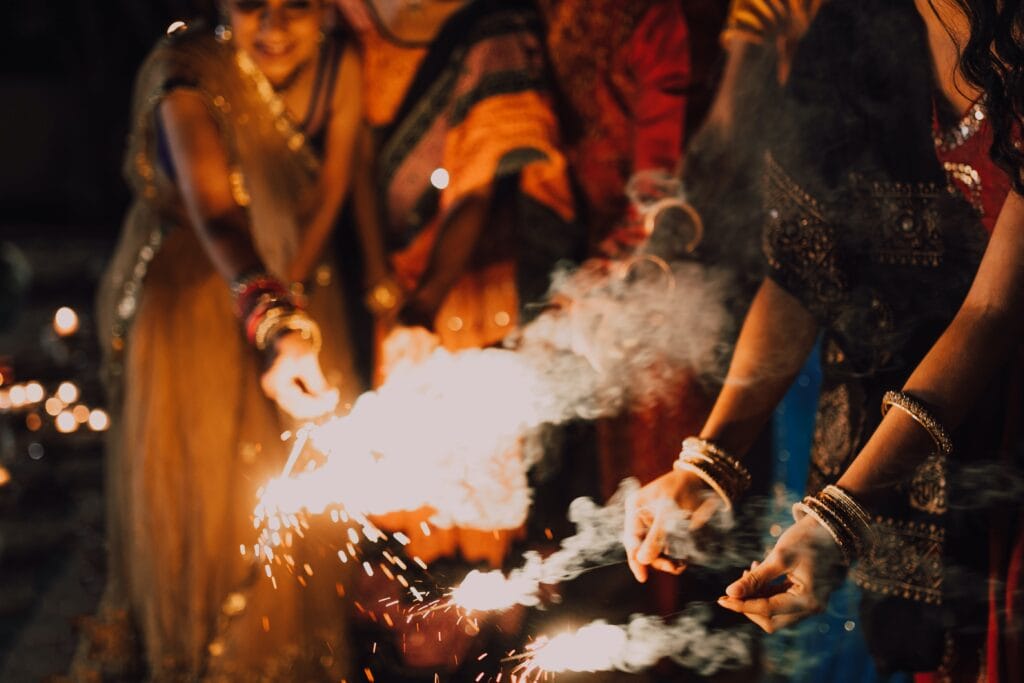
The dates for Diwali differ each year as it is based on the Hindu lunar calendar with the festival typically taking place between the months of October and November. The exact date of Diwali is determined by the position of the moon and varies annually. In 2023, Diwali is celebrated on 12 November.
Diwali, also known as Deepavali, is one of the most significant and widely celebrated festivals in India and by Indian communities around the world. For Australian migrants from an Indian background or those interested in Indian culture, Diwali offers a vibrant and joyful experience to be celebrated within the multicultural context of Australia.
Diwali holds great cultural and religious significance for Hindus, Sikhs, Jains, and some Buddhists and symbolises the victory of light over darkness, good over evil, and knowledge over ignorance. The festival commemorates various mythological events and historical milestones, making it a time for celebration, reflection, and renewal.
During the weeks leading up to Diwali, households and communities engage in many activities to prepare for the festival, like cleaning and decorating homes, with the idea to create a welcoming environment for the deities and to invite good fortune and prosperity. Traditional oil lamps called “diyas” are also lit to illuminate the surroundings.
Rangoli and decorations play a big part in Diwali as colourful patterns called “rangoli” are created using coloured powders, rice, or flower petals. These intricate designs, placed at the entrance of homes, are believed to welcome divine energy and bring good luck.
Traditional clothing also plays a significant part during Diwali as people dress in their finest traditional clothes, such as sarees for women and kurta-pyjamas or dhoti-kurtas for men and wearing new clothes signifies a fresh start and a celebration of abundance.
During Diwali friends and family also exchange gifts like sweets, and dry fruits as a gesture of love and appreciation and is seen to promote bonding and strengthen relationships. In fact, traditional Diwali sweets and treats like “ladoo,” “barfi,” “jalebi,” and “gulab jamun” are prepared and shared with family, friends, and neighbours.
While fireworks are another integral part of Diwali celebrations as sparklers, firecrackers, and colourful fireworks light up the night sky, adding light to the festive spirit.
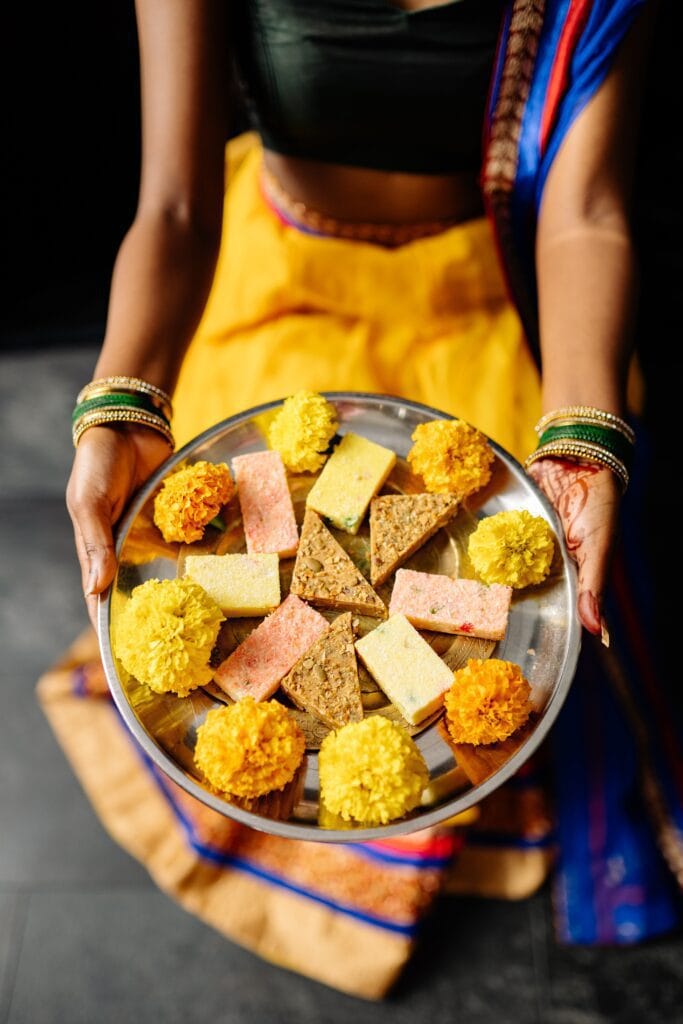
We spoke to two people connected to Navitas Skilled Futures who will be observing Diwali and asked them to provide some insight into this significant festival widely celebrated worldwide.
What is your role within Navitas and where are you located?
Giri Shanker (GS) – I am an Operations Manager with Navitas Skilled Futures. I am located in Sydney but was from Singapore formerly. I moved to Sydney in 2017 and my wife joined me in 2019.
Shruti Shukla (SS) – I learn English through the Navitas Volunteer Tutor Scheme. I study on Zoom every week with a volunteer teacher.
Can you provide a brief overview of Diwali – its meaning, what it observes and how it is practised?
GS – Diwali or Deepavali, as it is known in Singapore as well with South Indians, is one of the most important and widely celebrated festivals in India and among Hindus worldwide. It is usually celebrated over a few days, (depending on the country) between October and November. Deepavali is the Hindu festival of lights celebrating the victory of Lord Krishna over the demon Narakasura, who had been causing immense suffering to people. His defeat is celebrated as a triumph of good over evil. The celebration usually spans five days and the usual practices are as follows (in Singapore).
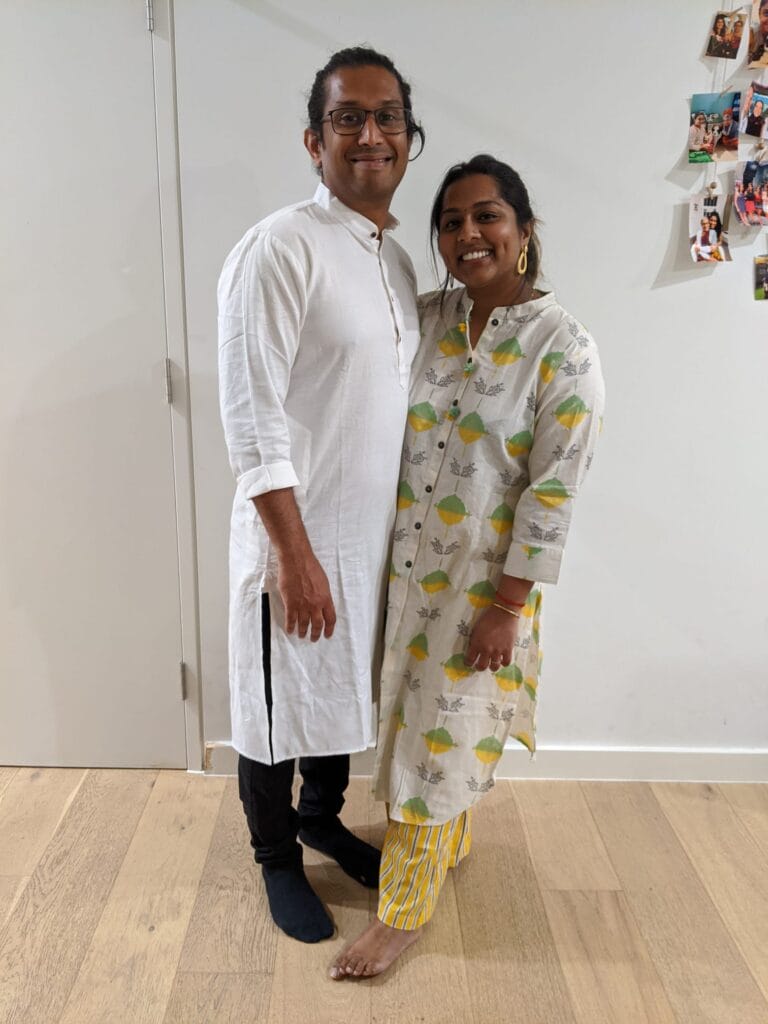
In preparation for the festival, the house is thoroughly cleaned, sometimes refreshed with a new coat of paint. Older furniture is discarded and replaced with new. In preparation for the festival, mother’s will usually start making Deepavali delicacies such as semolina cookies, various types of murukku, Gulab Jamun and other favourites, such as Bhaji and samosas. We will start buying new traditional clothes for the day and our homes are decorated with Deepavali fare.
In the morning everyone gets up early to help with any additional preparation. This is followed by a shower, adornment of new clothes and by prayers at home. Rangoli, which are coloured patterns, are drawn at the entrance of the homes and clay oil lamps are lit throughout the house.
Then the family visits their temple of choice for communal prayers and blessings. This is then followed by house visits to family and friends. It is customary to exchange gifts and sweets with family, friends, and neighbours signifying love and appreciation. Delicious traditional meals and sweets are prepared and shared among family and friends as a part of the festivities.
Fireworks are common during the main night of Diwali, however, there is a growing awareness of the environmental impact, and some regions have encouraged more eco-friendly celebrations. But every child and family member can be seen holding sparklers in the evening, the midst of festive decorative lightings, symbolically celebrating light over darkness
SS – Diwali is one of the most significant Hindu festivals celebrated in India. It is a festival which commemorates the victorious return of Lord Rama to Ayodhya after saving his wife Sita from the demon King Ravana. When Lord Rama came back to his home, the locals expressed their happiness and joy by lighting candles and oil lamps called “diyas” hence why Diwali is often referred to as a festival of lights. It’s a symbol of good over evil, knowledge over ignorance or light over darkness. Children and adults love setting off crackers and fireworks. Colourful patterns called Rangoli are often drawn in chalk on the ground outside the house, traditionally by women or girls.
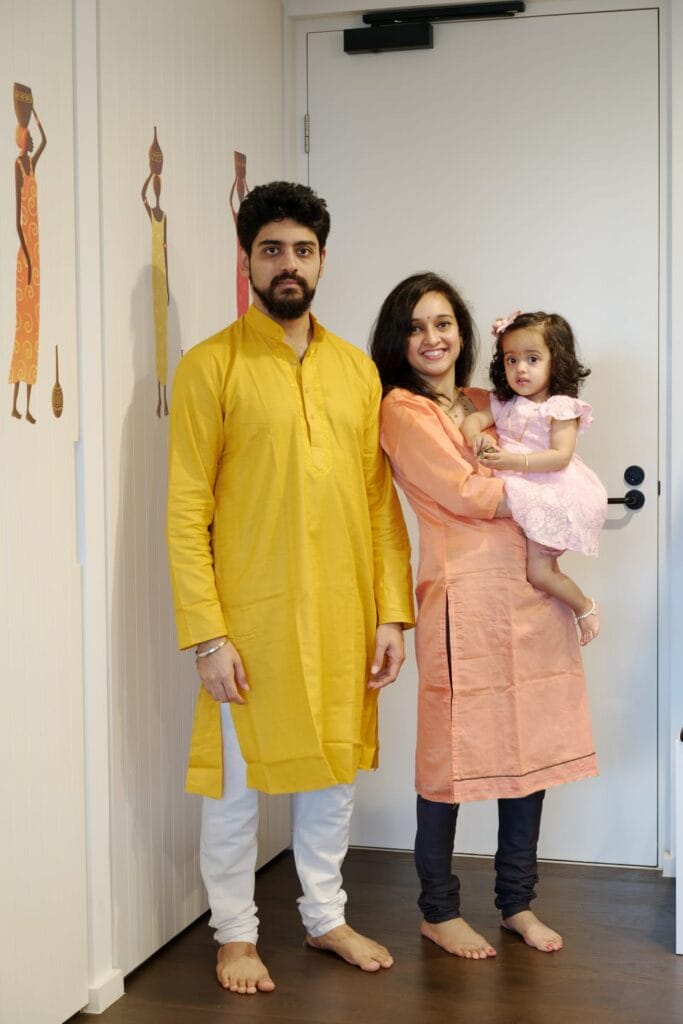
The celebration of Diwali starts a couple of days before when you buy things made of gold and silver or even steel depending on your capacity. You might buy a piece of jewellery or a new steel pot for your kitchen. You also buy some new clothes to be worn on Diwali. You buy idols of Lakshmi and Ganesha made of sand. Lakshmi is the goddess of wealth and Ganesha is the god of good beginnings. On Diwali eve, the celebration starts with prayers, sweets and snacks being offered to the gods. After prayers, candles and diyas are lit to be kept outside the house and people also hang colourful lights on the walls or gates. The idols are kept for a year and then at the next Diwali you put them in the nearest river where they float away and dissolve, starting over with new idols.
What does Diwali mean for you personally?
GS – It is a beautiful occasion that calls us to gather as a family and community, rejoicing in love, peace, and well-being. It serves as a gentle reminder to express gratitude and extend acts of kindness to one another.
SS – Diwali was a festival I used to celebrate with a lot of joy and happiness back in India. The excitement of buying and wearing new clothes and eating a wide variety of food my Mum used to make. It was a chance to visit families and friends, set off crackers and play all night. I loved decorating my house and making Rangoli. It was a festival to eat and laugh together. Everybody in the community would take part and celebrate. No one could sleep anyway because of the noise of firecrackers.
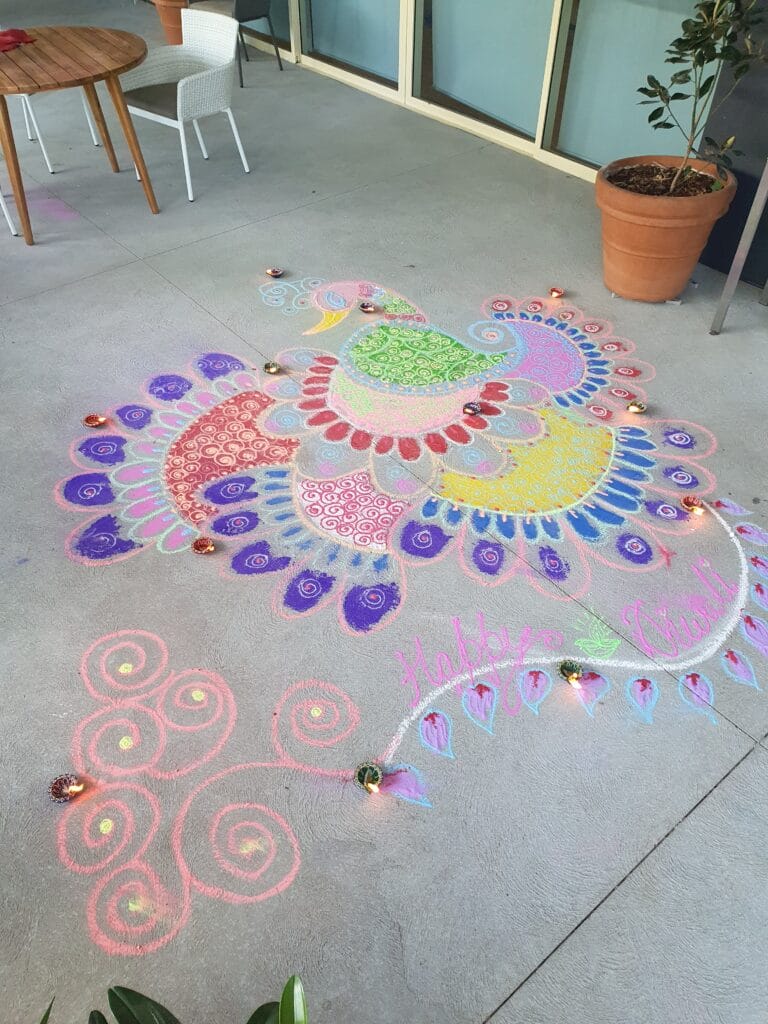
What traditions do you observe/practice?
GS – In anticipation of the festive day, my wife and I engaged in preparations weeks ahead, diligently cleaning and organising our household. We take delight in adorning our home with vibrant decorations that exude the spirit of celebration. Last year, we experimented with making homemade murukku – a fried and savoury snack made from rice and lentils. As this was our first time, we were assisted by our mothers over Zoom. In addition, my wife skilfully baked delectable semolina biscuits – our favourites.
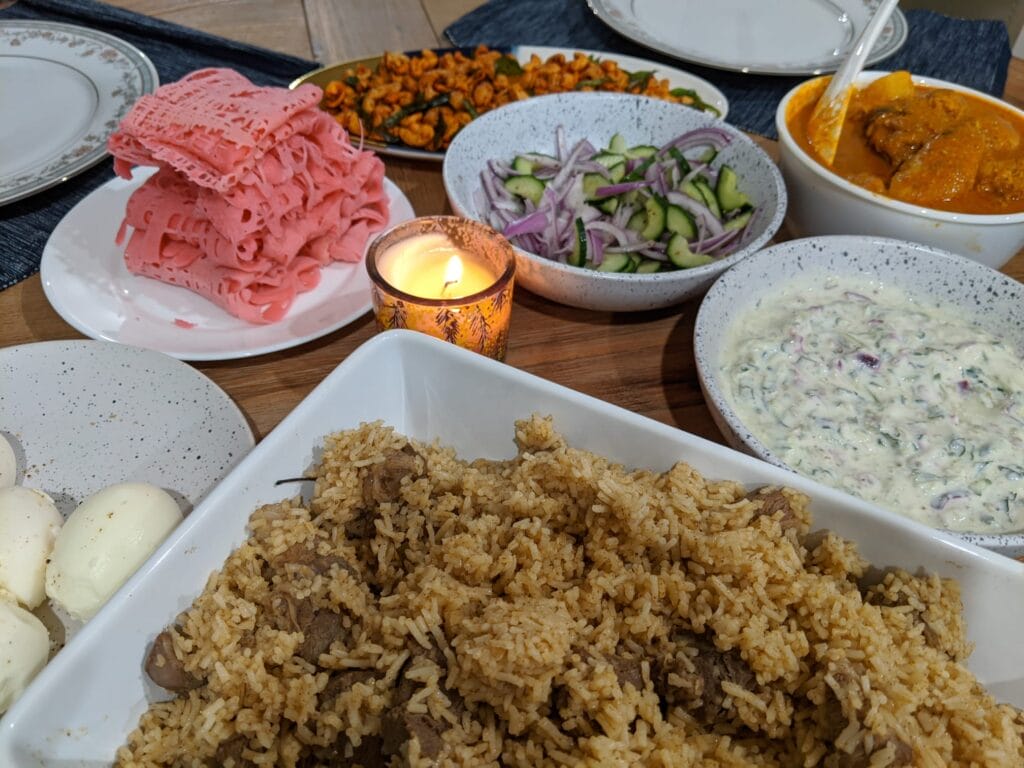
Our caring families from Singapore graciously sent us traditional Indian attire, adding to the excitement of the special day. On the morning of the day, we cherished a soulful visit to the temple in Parramatta, Sydney, where we humbly offered our heartfelt prayers. Embracing the essence of togetherness, we warmly invited our dear friends to our home, extending the joy of the occasion over a delightful dinner.
SS – In Australia, most of our close friends are not Indian so they wouldn’t normally celebrate Diwali. But I invite them anyway to join us on Diwali eve to make it a special evening. Since I moved to Summer Hill, I have started inviting some close friends around Diwali for lunch in the park. We take chairs and picnic mats and after the party we relax and drink tea at home. This gives me the satisfaction that I have celebrated my festival even if it’s not exactly in the same way as I did it in India. I try to cook special sweets and food on Diwali and clean our place of worship, decorate with flowers and fruits before doing the evening prayers. We wear new clothes and dress up for the day. Since we can’t light candles or diyas unlike in India, I put tea lights outside my doorstep. Last year, I also drew some colourful designs in chalk on the floor outside the foyer at work and outside my apartment. After doing the prayer, we call our families back home and get blessings from elders and relatives. I recall one time where we also got permission from the building management to light sparklers.
How will you and your family members be recognising Diwali this year?
GS – We would very much like to celebrate it with our families back in Singapore. However, since moving to Sydney, our friends have been an integral part of our lives, and their presence has become ever so cherished. To share the festivities with those close to us, we will be inviting them over for a heartwarming get-together over a spread of delectable Indian cuisine. The laughter we share with our friends make these moments even more meaningful, fostering a beautiful sense of belonging and love during this special celebration.
SS – I haven’t planned it yet but maybe I will invite some friends to join us and celebrate and will try to get permission again to light sparklers. I will prepare sweets and cook something special for the day.
If a colleague wants to wish you well during this time, how should they phrase the greeting?
GS – Happy Diwali or Deepavali is the usual greeting. If one wants to elaborate on this, it would be Wishing you and your family a wonderful and happy Deepavali celebration.
SS – Wishing someone well for any Hindu festival is super easy. On Diwali, one can simply say Happy Diwali or Happy Deepawali which means to have a joyous festival or a blissful festival.
